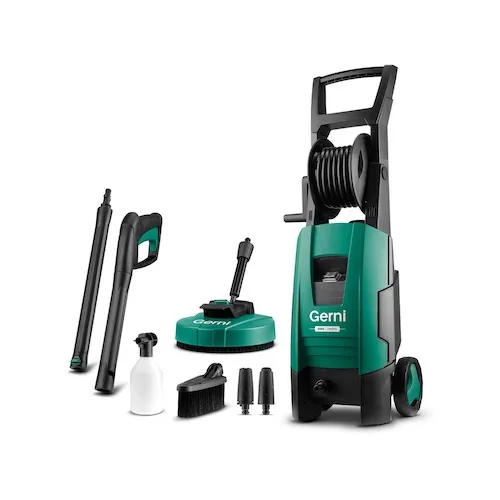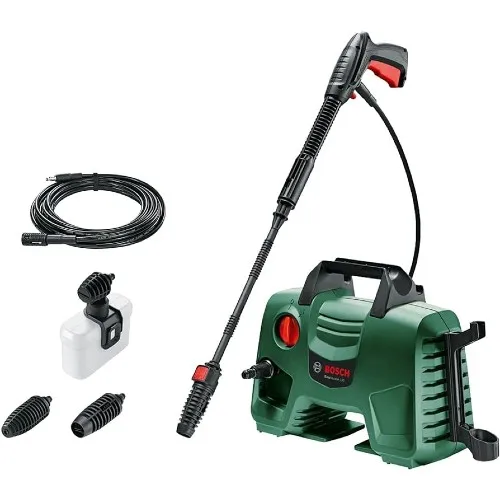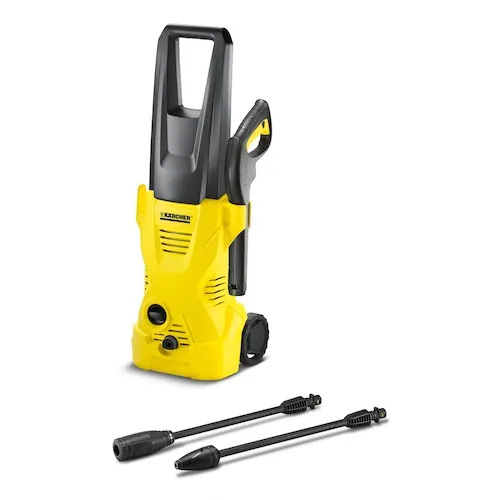Top Pick for
Overall pressure washer

Top Pick for
Overall pressure washer

Top Pick for
Cheap pressure washer

Top Pick for
Pressure washer for concrete

Top Pick for
High-pressure washer

A pressure washer produces high-pressured water to remove mould, grime, dust and other stubborn dirt from surfaces. They're wonderful at deep cleaning grimy yards and keeping your cars squeaky clean. You have three main options when it comes to pressure washers—petrol-powered, battery-powered and electric-powered.
When choosing a pressure washer, consider your cleaning needs. For basic cleaning jobs, entry-level models priced between $100 to $200 should be enough. But after a deeper clean, higher-end models are your best bet.
For this list, our team has looked into different pressure washers available online. We evaluated models from brands such as Bosch, Gerni, Ryobi, DeWalt and Jet-USAS. For each category, we also considered the pressure washer's key product features, including value for money, pressure and flow rate, lance and user-friendliness.
Read our full methodology below.

The Gerni 5000 1885PSI 1800W High Pressure Washer is our pick as the best overall pressure washer. With an impressive rating of 4.3 out of 5 stars on Bunnings, it's clear that this washer has won the approval of many users.
Its standout features include a robust 1800W motor that delivers 1885psi, ensuring excellent performance and durability, and a raft of handy accessories designed for various cleaning tasks at home. The mid patio cleaner with adjustable spray and the foam sprayer are particularly noteworthy, making cleaning decks, patios, paths, and even vehicles a breeze. The 360° handle rotation is another ingenious feature that simplifies hose handling.
Despite these advantages, it does come with a few cons. Firstly, the 8m hose length may not be sufficient for larger properties or extensive cleaning tasks. Plus, the washer's hefty power may make it less suitable for delicate surfaces or objects that might be damaged by high pressure. However, considering everything, this washer is a top-notch choice for most domestic cleaning needs.

In the 2023 Finder Retail Awards, we surveyed over 34,000 Australians about their retail purchases to discover which were their favourite brands across 170 product categories and over 1,200 total brands.
For pressure washers, Gerni was ranked 1st for value for money, 1st for performance, 1st for ease of use and 1st for cleaning and maintenance.
13 brands were rated across these decision criteria.

The Bosch Home & Garden High Pressure Washer EasyAquatak 120 is a cost-effective choice for those seeking excellent performance at an affordable price. It has received a commendable rating of 4.5 out of 5 stars on Amazon, a testament to its reliability and efficiency.
This compact device impresses with its 120 bar of pressure and a powerful 1500W motor, providing adequate cleaning power for various outdoor tasks. Including a high-pressure detergent nozzle is an added advantage, enabling efficient, time-saving soap application. Moreover, its quiet operation enhances user comfort significantly.
However, the EasyAquatak 120 might not be the best fit for tougher cleaning tasks. Its compact design could limit its ability to tackle more demanding chores.

The Gerni 5000 1885PSI 1800W High Pressure Washer is also our choice for the best electric option, garnering a rating of 4.5 out of 5 stars on Bunnings. It's designed for Aussie conditions, featuring an 8m hose with a hose reel for easy storage and a tall handle for convenient transport. The 360° spray handle rotation offers comfort during cleaning, preventing strain even during long sessions.
The unit has a mid-patio cleaner perfect for cleaning decks, patios, and paths. Its variable spray adjustment promises high efficiency and impressive cleaning results. The wash brush, with its soft bristles, ensures gentle cleaning without causing any damage to the surface. Additionally, the variable spray nozzle, with a 15° fan-shaped spray, is ideal for everyday general cleaning and can tackle various cleaning tasks.
However, despite its excellent features, the Gerni 5000 has a couple of limitations. Firstly, due to its powerful 1800W engine, it may not be the most energy-efficient option on the market. Moreover, it's a bit bulkier than some other electric pressure washers, but this is to be expected from a unit of its size and power.

In the 2023 Finder Retail Awards, we surveyed over 34,000 Australians about their retail purchases to discover which were their favourite brands across 170 product categories and over 1,200 total brands.
For pressure washers, Gerni was ranked 1st for value for money, 1st for performance, 1st for ease of use and 1st for cleaning and maintenance.
13 brands were rated across these decision criteria.

The Jet-USA 4800PSI Petrol High Pressure Cleaner Washer w/ 30m Hose Reach and Drain Cleaner is an outstanding petrol option garnering a perfect 5-star rating on Edison.
It boasts a potent 7HP four-stroke OHV engine, an Ultimate Edition feature set with a 30m hose reach, and a specialised Drain Cleaner nozzle. The product's rugged, tubular trolley-style frame and oversized 12" tyres are ideally suited for any terrain.
Additionally, 5 Pro-tip nozzles, a built-in detergent tank, a soft-grip handle, and features like low oil shutdown all contribute to its optimal power, easy starting, and superior reliability.
However, this premium performance comes with a hefty price tag of $799, which could be a potential drawback for some. Another minor con could be its position securing rubber feet. While effectively securing the washer, they may require a flat and solid surface for optimal function.
42% off Jet-USA 4800PSI Petrol High Pressure Cleaner Washer w/ 30m Hose Reach and Drain Cleaner
49% off Jet-USA 4800PSI Petrol High Pressure Cleaner Washer w/ 30m Hose Reach and Drain Cleaner

We recommend the Bosch Home & Garden AdvancedAquatak 140 for car enthusiasts seeking a robust and effective cleaning solution. With a remarkable 4.5 out of 5 stars on Amazon, the product certainly lives up to the high standards that users have come to expect.
Equipped with a 2100-watt motor and capable of delivering water at 480 litres per hour at 2030 PSI, this pressure washer can handle even the most stubborn dirt, making it perfect for car cleaning tasks.
The range of upgraded nozzles, including the variable fan jet nozzle, rotary nozzle, and foam nozzle, make it highly versatile for various cleaning tasks. The high-pressure detergent nozzle is especially useful when washing cars, as it applies soap quickly and efficiently, aiding in removing stubborn dirt.
Do note that the self-priming pump, which can automatically draw up water for greater energy efficiency, requires a separately sold Self-Priming Kit. Users may not fully benefit from the pump's impressive capabilities without this kit. Secondly, the handle is still relatively heavy, which could be a factor to consider for those needing to frequently move the unit around.

The Kärcher K2 Plus High Pressure Washer enjoys a high rating of 4.6 out 5 stars on Amazon, making it our pick for the best option for concrete cleaning.
It features a universal motor and non-corrosive N-COR pump, which ensures long-lasting and optimal performance. The patented Dirt Blaster spray wand is also ideal for tackling stubborn dirt and grime on hard surfaces such as concrete. Plus, the high-pressure hose, stretching a generous 20 feet, provides substantial reach, making it a breeze to clean larger areas.
Furthermore, the convenient onboard detergent siphon hose facilitates effortless soap application. Kärcher's promise of a 'Cleaner. Quicker' experience is truly encapsulated in this model.
The K2 Plus may not be the best choice for very heavy-duty jobs. And despite the hose being kink-resistant, careful handling is still needed to avoid any potential damage or tangling issues.

With a rating of 5 out of 5 stars on Edison, our team has also chosen the Jet-USA 4800PSI Petrol High Pressure Cleaner Washer w/ 30m Hose Reach and Drain Cleaner as the best high pressure option.
The Jet-USA 4800PSI Petrol High Pressure Cleaner Washer w/ 30m Hose Reach and Drain Cleaner is not just a regular high-pressure washer. Powered by a robust 7HP four-stroke OHV engine, it delivers an impressive, consistent performance. Its rugged tubular trolley-style frame is designed to withstand heavy use, making it an ideal option for various tasks like cleaning cars, windows, and paths. The Ultimate Edition boasts a 30m Hose reach and a Drain Cleaner nozzle, extending its capabilities further.
This model has five pro-tip nozzles, allowing users to choose the right pressure for each task. Oversized 12" tyres ensure the washer can be moved with ease, even on rugged terrains. It also features a built-in detergent tank, greatly simplifying the process of mixing water and soap. The soft-grip handle adds to your comfort, while the low oil shutdown feature ensures the machine's longevity by protecting the engine from damage.
Despite these fantastic features, there are a couple of aspects to consider. The first is the size of the washer. Due to its robust construction and numerous features, it is quite large and might be challenging to store if space is an issue. Secondly, beginners might find the numerous nozzle options a bit overwhelming at first.
42% off Jet-USA 4800PSI Petrol High Pressure Cleaner Washer w/ 30m Hose Reach and Drain Cleaner
49% off Jet-USA 4800PSI Petrol High Pressure Cleaner Washer w/ 30m Hose Reach and Drain Cleaner
In the 2023 Finder Retail Awards, we surveyed over 34,000 Australians about their retail purchases to discover which were their favourite brands across 170 product categories and over 1,200 total brands.
For pressure washers, Bosch was ranked 3rd for value for money, 6th for performance, 4th for ease of use and 5th for cleaning and maintenance.
13 brands were rated across these decision criteria.
ity

The Bosch 1700W Electric High Pressure Washer UniversalAquatak 130 is an excellent choice if you are searching for a compact yet powerful cleaner. This high pressure washer boasts an impressive 4.5 out of 5 stars on Amazon.
Its compact size, combined with the telescopic handle that halves the unit's height during storage, makes it an ideal option for those with space constraints. The washer's powerful 1700W motor and 130 bar pressure ensure thorough and efficient cleaning of even the toughest dirt.
However, it's worth mentioning that the self-priming pump requires a separate kit for operation, which may be inconvenient for some users. The max flow temperature is also limited to 40 °C, which might impact cleaning performance in certain situations.

The Ryobi 36V 5.0Ah Pressure Washer Kit is a remarkable tool, scoring a high rating of 4 out of 5 stars on Bunnings.
The unit's standout feature is its cordless convenience, made possible by innovative battery technology. This pressure washer can operate with one or two 36V batteries, ensuring extended run times without the limitations and hazards of cords. Tackling outdoor cleaning and maintenance tasks becomes significantly easier with this kit.
Its tough metal roll bars afford rugged protection, proving its suitability for outdoor applications. With a maximum pressure of 1800PSI, a hose length of 7.6m, and a trigger gun equipped with turbo, fan, and soap nozzles, it offers versatility and comprehensive cleaning capabilities.
But the kit could benefit from improvements in weight distribution to enhance user comfort during prolonged use. Additionally, the battery life may require frequent charging during larger, more demanding projects.

Gerni has emerged as a leading name in the world of pressure washers, outperforming 13 other competing brands to claim the title of this year's best pressure washer brand at the Finder Retail Awards 2023. This accolade is not awarded lightly, and Gerni's top-notch performance and ease of use have made the brand the top choice for customers.
Performance is a key factor when choosing a pressure washer, and Gerni pressure washers have been consistently superior. Their high-pressure output, combined with the efficiency and durability of their motors, provides the power required to swiftly and effectively clean large areas.
Ease of use is another area where Gerni shines. The Gerni pressure washers are designed with user-friendly controls and features, making them accessible for individuals of all skill levels.
Moreover, 92% of surveyed customers recommended Gerni, indicating a high level of customer satisfaction and trust in the brand. This strong endorsement from users underscores the brand's quality and reliability.
 MyDeal
MyDeal
Garden hoses and reels as low as $18.89
Save when you shop garden hoses and reels at MyDeal, with prices starting as low as $18.89. While stocks last. T&Cs apply.
 Amazon
Amazon
Garden hoses as low as $17.90
Shop for garden hoses and other watering accessories on sale at Amazon for as low as $17.90. While stocks last. T&Cs, exclusions apply.
 Hoselink
Hoselink
$10 off your first order over $50
Ends
Sign up to Hoselink's newsletter and get $10 off your first order of hoses and gardening tools. Minimum spend $50. T&Cs apply.
 Amazon
Amazon
Up to 20% off pressure washers
Enjoy great savings on pressure washers when you shop at Amazon. While stocks last. T&Cs apply.
 Edisons
Edisons
Up to 50% off petrol pressure washers
Grab up to 50% discount on petrol pressure washers. Hurry while stocks last. T&Cs apply.
 eBay Australia
eBay Australia
Up to 55% off pressure washers
Score great savings on pressure washer at eBay. While stocks last. T&Cs apply.
For this list, we looked into numerous pressure washers available in various online retailers like Amazon, Bunnings and eBay. We also evaluated models listed on productreview.com.au. Our team examined pressure washers from the following brands:
We narrowed down our choices based on customer ratings and reviews (as of September 2023). We also considered each model's key product features, value for money, battery life (where applicable), weight, user-friendliness and pressure. We came up with what we believe are the 8 best pressure washers available online.
A pressure washer or cleaner is a tool that connects to your garden tap and delivers a powerful, high-pressure stream of water through a cleaning nozzle. Also known as water blasters, these cleaners provide a fast and efficient way to clean driveways, patios, tiles, concrete, cars, bikes and more.
The main advantage of using a pressure washer is that if you need to give a dirty, muddy or mouldy area a deep clean, a pressure washer is much quicker and easier than a hose, bucket and scrubbing brush.
You can use a pressure washer for a wide range of cleaning jobs, including the following:
If you only need a pressure washer for a one-off job, you might be better off renting one for a day from an equipment hire service like Kennards Hire. Check the daily rates in your area before deciding whether hiring might be a more sensible option.
Also, you don't always need to spend a lot to get the cleaning power you want. If you only want a pressure washer for basic jobs, for example blasting mud off your bicycle and getting your outdoor furniture looking new, an entry-level model for less than $200 should have all the power you need.
There are 3 main options when choosing a pressure washer:
Cost will always be a major consideration when buying a pressure washer. You can pick up an entry-level electric-powered model for around $50, but most units sit within the $100–$600 price range. As a general rule, the more money you spend, the more cleaning power you'll get. Petrol-powered pressure washers start at $300 and go up to around $2,000 for an industrial-grade model.
There are many additional factors you should take into account when buying a pressure washer. Here's what you need to consider:
Some manufacturers provide an all-in-one adjustable nozzle to change the angle and force of the spray, while others provide a set of interchangeable nozzles. Check what nozzles and attachments are included as standard to suit different surfaces. Regular options include pinpoint spray, a wide fan nozzle and turbo (or rotary) nozzle.
Also consider what brushes the pressure washer comes with to help you scrub your back deck, wash your car, clean drains or perform other specialist tasks. For example, a patio cleaner attachment can be an extremely useful inclusion if you have a large outdoor area to clean.
There are 2 key factors that determine the cleaning power of a pressure washer: water pressure and flow rate. Check the maximum water pressure for any unit you're considering – 1,600–2,500 PSI is a common range for electric-powered pressure washers. Some models feature an LED display to allow you to easily check the pressure setting you are using.
Also, check the maximum rated flow (measured in litres/minute, or gallons/minute if shopping with a US retailer) of the unit you're considering. Electric units are commonly between 5 and 7.5L/minute.
Also known as the spray wand, this directs the spray onto whatever surface you're cleaning. Metal wands are more durable than plastic ones, and it's also important that the wand is long enough for you to reach the ground without stooping.
Some models come with extension wands for jobs like cleaning second-storey windows, and angled wands that can work with an extension wand to clean gutters.
Check the length of the hose that runs from the body of the cleaner to the spray lance. The longer it is, the easier the machine will be to use.
Some models incorporate storage space for the lance and hose into the unit so they take up less room in your shed.
Most pressure washers feature some sort of detergent injection system for increased cleaning power.
There are a couple of important things to remember before using a pressure washer:
The Finder Customer Satisfaction Awards is an annual national survey conducted in partnership with research firm Dynata. With over 30,000 real shoppers participating, the awards serve as a reliable reflection of Australian consumers' preferences and opinions.
Here are the scores for pressure washer brands from 2024.
| Brand | Cleaning and maintenance | Ease of use | Overall | Performance | Value for money | Recommended | Total Score |
|---|---|---|---|---|---|---|---|
| Gerni | 4.5 | 4.5 | 4.5 | 4.5 | 4.4 | 92% | 4.47 |
| Stihl | 4.3 | 4.5 | 4.6 | 4.5 | 4.3 | 94% | 4.46 |
| Husqvarna | 4.4 | 4.4 | 4.4 | 4.5 | 4.3 | 97% | 4.45 |
| Makita | 4.3 | 4.5 | 4.4 | 4.5 | 4.2 | 98% | 4.44 |
| Briggs & Stratton | 4.3 | 4.3 | 4.4 | 4.4 | 4.4 | 100% | 4.43 |
| Ryobi | 4.4 | 4.2 | 4.2 | 4.5 | 4.3 | 96% | 4.39 |
| Bosch | 4.3 | 4.4 | 4.4 | 4.4 | 4.3 | 86% | 4.31 |
| Karcher | 4.4 | 4.3 | 4.3 | 4.4 | 4.2 | 87% | 4.29 |
| Hitachi | 4.2 | 4.1 | 4.2 | 4.2 | 4.1 | 92% | 4.21 |
| Aussie Pumps | 4.2 | 4.2 | 4.2 | 4.3 | 4.1 | 82% | 4.17 |
| Stanley | 4.1 | 4.1 | 4.1 | 4.2 | 4.2 | 88% | 4.16 |
| Jet-USA | 4.1 | 4.1 | 4.1 | 4.2 | 4.1 | 85% | 4.15 |
| Homelite | 4 | 3.9 | 3.9 | 3.9 | 4.1 | 76% | 3.9 |




Today's best deals in Australia include: 20% off the Apple AirPods, 60% off tech at The Good Guys, $60.95 off Nintendo Switch OLED.
Our shopping experts chose this model due to its space-saving design, ease-of-use, customer testimonials and overall bang for buck.
These are the 10 best massage guns available right now in Australia.
A maverick teacher uses poetry to embolden his boarding school students to new heights of self-expression. Here's where to watch Dead Poets Society online.
A knight attempts to settle his dispute with his squire by challenging him to a duel. Here's where to watch The Last Duel online.
A team of commandos on a mission find themselves hunted by an extraterrestrial warrior. Here's where to watch Predator online.
Follow the aristocratic Crawley family and their servants in the post-Edwardian era. Here's how to watch the Downton Abbey TV series online in Australia.
Does Dreamworld still deliver a good theme park experience if you're looking for things to do on family holidays to the Gold Coast?
A cure-all cleanser that can banish blemishes, congestion, dullness, breakouts and reduce fine lines.
You can add to your experience of watching a Formula 1 Grand Prix with F1 TV. Here are details about its price, content and more.